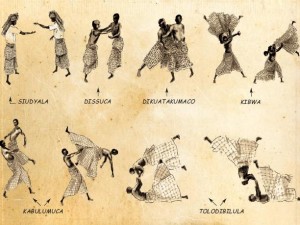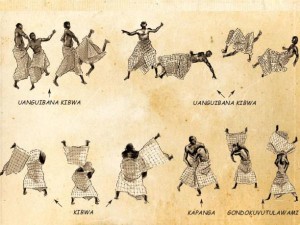Bassula is one of the traditional martial arts of Angola, the term Bassula means swiping, making the opponent to fall. This art was practiced in the community of Axiluanda, by the Axiluandas and Bessangans in the Luandan coast, the greatest practitioners could be found among fishermen. One of the last masters was António Joaquim (Cabetula), who was born on August 20, 1920 in Ilha do Cabo in Luanda and died at age 84 in Mussenda (Boavista), a place that no longer exists.
 The Master in life with social circles, lots of mufete, (a dish consisting of palm oil beans and fish, mackerel) maruvo (alcoholic drink fermented from the liquid extract from palm trees ) and wine, with and other younger Axiluandeses and Bessangans, reported many fantastic tales of facts that occurred in other times, the number of kibwas (falls) and kapangas (locks ) practiced on this acrobatic game and traditional activity of the coastal community of Luanda, a current practice of the sons of the network circumscribed to Mussulo, Corimba (Kolimba), Samb-Kamuxiba, passing through Ilha do Cabo to Cacuaco (Kakwaku) whose “brains and eminent Bassulistas were the ones from Ilha do Cabo nowadays Ilha de Luanda”.
The Master in life with social circles, lots of mufete, (a dish consisting of palm oil beans and fish, mackerel) maruvo (alcoholic drink fermented from the liquid extract from palm trees ) and wine, with and other younger Axiluandeses and Bessangans, reported many fantastic tales of facts that occurred in other times, the number of kibwas (falls) and kapangas (locks ) practiced on this acrobatic game and traditional activity of the coastal community of Luanda, a current practice of the sons of the network circumscribed to Mussulo, Corimba (Kolimba), Samb-Kamuxiba, passing through Ilha do Cabo to Cacuaco (Kakwaku) whose “brains and eminent Bassulistas were the ones from Ilha do Cabo nowadays Ilha de Luanda”.
Practitioners saw summer as the right period for practice and learning of the modality. The Bassula de Bissoco (friendship) was the real sportive and recreational fight where family, friends and trustworthy people practiced on reserved occasions, sinners also prepared for certain challenges, confrontations in social life and personal defence in case of conflicts with rivals or neighbours.
In marriage ceremony, in some families, the son-in-law was tested with the Bassula of Kissoco by the future father-in-law of the bride. His character was only recreational, pretending that he was not a good fighter in order not to be disrespectful (exposing him to a fine in quantity of drinks and some quitutes) there was the simulation of the defeat.
On other occasions, rival dance groups often faced each other at the Carnival in Angola, they were neighbourhood fights, conflicts were violent when rival groups met around the city using Bassula and the fight ended only when the authorities would arrive.
The Bassula of Jinvunda was violent and the contenders had to demonstrate their techniques and abilities, sometimes using artefacts such as staves (barrel boards) and razors.
The Samba Grande fishermen practiced Bassula, from the Ilha do Cabo and Samba Pequena, who were, basically, people of the same lineage origin, this was to strengthen friendship and brotherhood, which corresponds to the popular saying “the richness and joy of the African man is in their social cohesion “
Nowadays, the luxury of exogenous elements in the culture Axiluanda society , typical of socio-cultural dynamics, has diluted and nationalized the Bassula, a sport of friendship, its fall is due to the forgotten by the non-transmission of its values to the new generations, which despite of its main activity, fishing, associated with beliefs around the sea and to Kianda, object of evocations and prayers, the Axiluanda culture has gradually lost some significant aspects of its identity, as a result of the strong luxury of exogenous elements and the Cultural miscegenation that characterize today the peoples of the Ilha de Luanda.
Although acculturation is an unavoidable process, the values of the Axiluanda culture, such as the techniques and handling of fishing instruments, the Rebita, the peculiar costumes of men and women in different circumstances and moments, the charm, the exuberance of Bessa Ngana just as the transcendence ceremonies of the deceased (death and widowhood rituals) remain and must be preserved.




